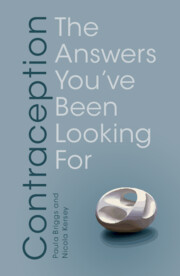70 results
Introduction
-
- Book:
- Contraception
- Published online:
- 01 June 2023
- Print publication:
- 01 June 2023, pp 1-2
-
- Chapter
- Export citation
Contents
-
- Book:
- Contraception
- Published online:
- 01 June 2023
- Print publication:
- 01 June 2023, pp v-viii
-
- Chapter
- Export citation
3 - Barrier Methods of Contraception
-
- Book:
- Contraception
- Published online:
- 01 June 2023
- Print publication:
- 01 June 2023, pp 31-38
-
- Chapter
- Export citation

Contraception
- The Answers You've Been Looking For
-
- Published online:
- 01 June 2023
- Print publication:
- 01 June 2023
5 - Progestogen-Only Pill
-
- Book:
- Contraception
- Published online:
- 01 June 2023
- Print publication:
- 01 June 2023, pp 53-56
-
- Chapter
- Export citation
7 - Fertility Awareness Method of Contraception
-
- Book:
- Contraception
- Published online:
- 01 June 2023
- Print publication:
- 01 June 2023, pp 66-74
-
- Chapter
- Export citation
Preface
-
- Book:
- Contraception
- Published online:
- 01 June 2023
- Print publication:
- 01 June 2023, pp ix-x
-
- Chapter
- Export citation
6 - Long-Acting Reversible Contraception: The Implant, Injection and Coil
-
- Book:
- Contraception
- Published online:
- 01 June 2023
- Print publication:
- 01 June 2023, pp 57-65
-
- Chapter
- Export citation
8 - Emergency Contraception
-
- Book:
- Contraception
- Published online:
- 01 June 2023
- Print publication:
- 01 June 2023, pp 75-81
-
- Chapter
- Export citation
Copyright page
-
- Book:
- Contraception
- Published online:
- 01 June 2023
- Print publication:
- 01 June 2023, pp iv-iv
-
- Chapter
- Export citation
Index
-
- Book:
- Contraception
- Published online:
- 01 June 2023
- Print publication:
- 01 June 2023, pp 90-96
-
- Chapter
- Export citation
2 - Making Decisions about Contraception
-
- Book:
- Contraception
- Published online:
- 01 June 2023
- Print publication:
- 01 June 2023, pp 12-30
-
- Chapter
-
- You have access
- HTML
- Export citation
9 - Use of Hormonal Contraception to Treat Other Conditions
-
- Book:
- Contraception
- Published online:
- 01 June 2023
- Print publication:
- 01 June 2023, pp 82-89
-
- Chapter
- Export citation
1 - Conception and the Menstrual Cycle
-
- Book:
- Contraception
- Published online:
- 01 June 2023
- Print publication:
- 01 June 2023, pp 3-11
-
- Chapter
- Export citation
4 - Combined Hormonal Contraception: The Pill, Patch and Vaginal Ring
-
- Book:
- Contraception
- Published online:
- 01 June 2023
- Print publication:
- 01 June 2023, pp 39-52
-
- Chapter
- Export citation
Copyright page
-
- Book:
- Managing the Menopause
- Published online:
- 18 June 2020
- Print publication:
- 02 July 2020, pp iv-iv
-
- Chapter
- Export citation
Index
-
- Book:
- Managing the Menopause
- Published online:
- 18 June 2020
- Print publication:
- 02 July 2020, pp 276-286
-
- Chapter
- Export citation
Contents
-
- Book:
- Managing the Menopause
- Published online:
- 18 June 2020
- Print publication:
- 02 July 2020, pp v-vi
-
- Chapter
- Export citation
Contributors
-
- Book:
- Managing the Menopause
- Published online:
- 18 June 2020
- Print publication:
- 02 July 2020, pp vii-x
-
- Chapter
- Export citation
Foreword
-
- Book:
- Managing the Menopause
- Published online:
- 18 June 2020
- Print publication:
- 02 July 2020, pp xi-xii
-
- Chapter
- Export citation



